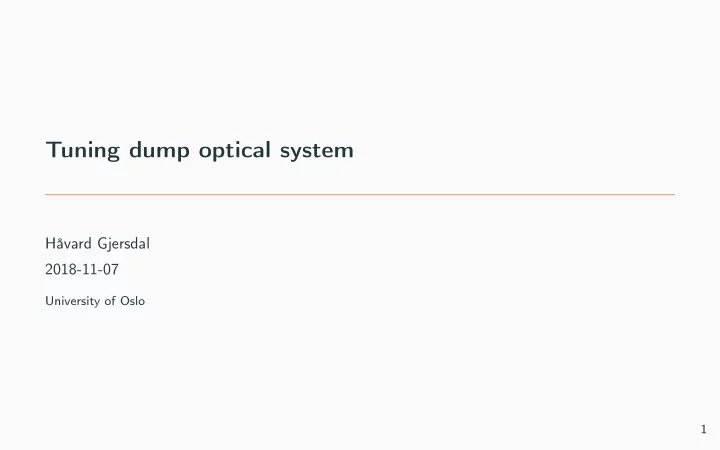

Tuning dump optical system Håvard Gjersdal 2018-11-07 University of Oslo 1
Imaging system • Goal:Image light from scintillating screen onto a camera. • To minimize dose, camera placed 1.5m inside concrete wall. • Optical path: through viewport, two flat mirrors and into hole in wall. 2
Requirements • Should be able to measure very small test pulses, as well as full ESS pulse. • Field of view: as large as possible • Better than 1 mm resolution across field of view • Camera and all other parts must be able to survive in environment without maintenance 3
Parts • Mirrors • Limiting apertures • Camera, lens • Filtering • Illumination 4
Mirrors M1: • Borosilicate • 1 λ over 25 mm • 290mm diameter • Centered on viewport M2: • Fused silica • λ/ 4 over surface • 110mm × 150mm • Centered hole in wall Exact position of hole in wall is not known yet. Mirrors should remain centered on apertures, angles adjusted. 5
Mirror support • Mirrors will be mounted to the Bendamount, allowing precise adjustment of three angles, one translation. • Design of support for the mounted mirrors is not fixed. One option is a sturdy strut profile frame, bolted to the wall and the floor. 6
Limiting apertures The viewport limits the field of view. Field of view is very close to 220mm in screen coordinate system. Elliptical in beam √ orthogonal system, minor axis 220 / 2 7
Limiting apertures Hole in wall limits entrance pupil size. Entrance pupil: 135mm/2 Entrance pupil: 135mm/2.8 This lets us use a 135mm lens operated at f/2.8 without vignetting. f/2 will brighten the center, but some darkening near the edges of the FoV. 8
Camera and lens Canon 135mm f/2L • Fast lens, large entrance pupil • Lens has internal motors to adjust focus, aperture. Possible to remote control. • Telephoto lens allows for large sensor, high sensitivity, high resolution. 9
Camera • 1 inch sensor (11mm × 11mm), for example Manta G-419B • GigE camera, power over ethernet • Camera, lens, controllers will be mounted in a tube, aligned in a lab, inserted and fixed in the wall 10
Filtering • Large dynamic range: must be able to see first test pulses, as well as a full ESS pulse. • Camera will saturate even at f/32, ND filters needed • Options are small filters inside the hole in the wall, or large filters outside. 11
Illumination • We need illumination for debugging • Thorlabs LED lamp (LIUCWHA) mounted between M1 and the viewport • 24V, supplied by EtherCAT module • Lamp will obscure part of screen 12
Conclusions A simple optical system. • Performance tested in simulations and prototype • Final mirrors ordered, mirror quality tested in prototype • Work remaining on control of filters and lens, mechanical support of mirrors and camera. 13
Recommend
More recommend